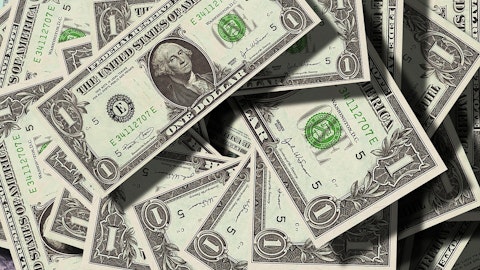Unexpectedly, there are growing concerns about a forthcoming U.S recession, thanks to softening industrial production over the past several months. Corporate profits for the fourth quarter of 2015 are on track to decline by a significant 5.8% year-over-year, which may also serve as reason for concern for stock market participants. However, one should not forget that the U.S labor market has been strengthening and consumer sentiment has been on the rise in recent quarters. Most importantly, investors and companies should be aware of self-fulfilling prophecies, as their worries might trigger an actual U.S recession by heavily curtailing investment and reducing workforces. Of course, the strong U.S dollar has put weight on companies’ profits in recent quarters, but a stronger greenback is a sign of global investors’ confidence in the strength of the U.S economy. Meanwhile, some companies’ insiders have been buying more shares of their companies lately despite increased economic worries. As a general rule, heavy insider buying represents a bullish signal, so let’s take a look at the recent insider buying behavior witnessed at three companies.
Most investors can’t outperform the stock market by individually picking stocks because stock returns aren’t evenly distributed. A randomly picked stock has only a 35%-to-45% chance (depending on the investment horizon) to outperform the market. There are a few exceptions, one of which is when it comes to purchases made by corporate insiders. Academic research has shown that certain insider purchases historically outperformed the market by an average of seven percentage points per year. This effect is more pronounced in small-cap stocks. Another exception is the small-cap stock picks of hedge funds. Our research has shown that the 15 most popular small-cap stocks among hedge funds outperformed the market by nearly a percentage point per month between 1999 and 2012 (read more details here). The trick is focusing only on the best small-cap stock picks of funds, not their lar
Let’s begin our discussion by analyzing insiders’ bullishness at Progressive Corp (NYSE:PGR). John F. Auer, President and Chief Executive Officer of ARX and ASI, bought 50,000 shares on Monday at a cost of $30.28 per share. After the recent purchase, the Executive holds an ownership stake of 106,003 shares. The stock of the auto insurance giant has advanced by 15% over the past 12 months despite losing 4% thus far in 2016. The company’s recent fourth-quarter earnings report shows that its growth has been slowing in recent months. Progressive Corp (NYSE:PGR)’s net premiums written for the quarter totaled $4.84 billion, which marked an increase of 5% year-over-year. Most importantly, the company’s net premiums written for December declined by 11% year-over-year to $1.39 billion. The fourth-quarter growth in premium revenue might be a cause for concern for some investors, considering that the company’s net premiums written for the nine months that ended September 30 grew by as much as 12% year-over-year, to $15.73 billion. However, Progressive’s operating results for 2014 counted in an additional week of activity for December, so comparisons presented above do not provide a completely accurate picture. Moreover, the company’s combined ratio, which is used as a measure of underwriting profitability, reached 92.0 in the fourth quarter, compared to 90.9 reported for the same period of the prior year. But the question of whether the stock represents an attractive investment or not still remains unanswered. The stock trades at a forward price-to-earnings multiple of 14.39, which is above the ratio of 11.4 for the Property and Casualty Insurance industry. Ric Dillon’s Diamond Hill Capital owns 5.28 million shares of Progressive Corp (NYSE:PGR) as of September 30.
Follow Progressive Corp (NYSE:PGR)
Follow Progressive Corp (NYSE:PGR)
Receive real-time insider trading and news alerts
The next two pages of this article reveal the insider purchases registered at Green Bancorp Inc. (NASDAQ:GNBC) and United Technologies Corporation (NYSE:UTX).





